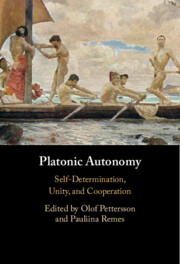Book contents
- Platonic Autonomy
- Platonic Autonomy
- Copyright page
- Contents
- Tables
- Contributors
- Acknowledgements
- Abbreviations
- Introduction
- Part I Self-Determination
- Part II Motivational Challenges to Self-Rule
- Part III Internal and External Authorities
- Part IV The Limits of Autonomy and Self-Rule
- Chapter 7 Vulnerability, Dialogue, and the Limits of Autonomy
- Chapter 8 Plato, Dialogue, and Epistemic Autonomy
- Part V Reconciling between Freedom, External Authority, and Nature
- Bibliography
- Index
Chapter 8 - Plato, Dialogue, and Epistemic Autonomy
from Part IV - The Limits of Autonomy and Self-Rule
Published online by Cambridge University Press: 07 August 2025
- Platonic Autonomy
- Platonic Autonomy
- Copyright page
- Contents
- Tables
- Contributors
- Acknowledgements
- Abbreviations
- Introduction
- Part I Self-Determination
- Part II Motivational Challenges to Self-Rule
- Part III Internal and External Authorities
- Part IV The Limits of Autonomy and Self-Rule
- Chapter 7 Vulnerability, Dialogue, and the Limits of Autonomy
- Chapter 8 Plato, Dialogue, and Epistemic Autonomy
- Part V Reconciling between Freedom, External Authority, and Nature
- Bibliography
- Index
Summary
This chapters argues that Plato’s notion of personal autonomy is closely linked to his understanding of the social dimension of rational deliberation. It begins with an assessment of Miranda Fricker’s influential account of epistemic authority and social power and raises some objections against the discursive notion of reason she develops. To substantiate these objections, it turns to Plato’s Cratylus and to Socrates’ analysis of logos as a language mediated form of rational deliberation. It argues that while Socrates suggests that the constitutive parts of language, the names (ta onomata), are ambivalent and deceptive, leaving discursive reason in doubt, Plato, at the same time, shows that it nevertheless can function to identify unwarranted claims of epistemic authority, as a form of codependent philosophical conversation. From this emerges a notion of Platonic autonomy closely tied to Plato’s analysis of the social dimension of rational deliberation and its embodiment in the Platonic dialogue.
Keywords
Information
- Type
- Chapter
- Information
- Platonic AutonomySelf-Determination, Unity, and Cooperation, pp. 169 - 190Publisher: Cambridge University PressPrint publication year: 2025
Accessibility standard: WCAG 2.1 AA
Why this information is here
This section outlines the accessibility features of this content - including support for screen readers, full keyboard navigation and high-contrast display options. This may not be relevant for you.Accessibility Information
Content Navigation
Allows you to navigate directly to chapters, sections, or non‐text items through a linked table of contents, reducing the need for extensive scrolling.
Provides an interactive index, letting you go straight to where a term or subject appears in the text without manual searching.
Reading Order & Textual Equivalents
You will encounter all content (including footnotes, captions, etc.) in a clear, sequential flow, making it easier to follow with assistive tools like screen readers.
You get concise descriptions (for images, charts, or media clips), ensuring you do not miss crucial information when visual or audio elements are not accessible.
Visual Accessibility
You will still understand key ideas or prompts without relying solely on colour, which is especially helpful if you have colour vision deficiencies.
Structural and Technical Features
You gain clarity from ARIA (Accessible Rich Internet Applications) roles and attributes, as they help assistive technologies interpret how each part of the content functions.
